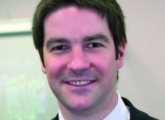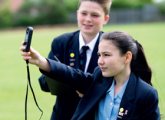POPULAR
(Maya Van Wagenen, Penguin, £7.99)
What does it mean to be popular? It’s a question that plagues many if not most teenagers – yet remains largely unarticulated, quite possibly because the implications of a clear answer are not ones that are comfortable to contemplate. Maya Van Wagenen moved to Brownsville, Texas, when she was 11 years old. Two years later, inspired by a 1950s book called Betty Cornell’s Teen-Age Popularity Guide and encouraged by her considerably less than conventional parents, she embarked on a secret social experiment – following Betty Cornell’s advice on fashion, deportment, attitude and manners, and writing about what happened. The resulting memoir is a fascinating glimpse into the complex but eminently deconstructable hierarchy of your average high school, whether in Texas or Teeside; and above all, a supremely reassuring reminder that as a rule, the kinder and more compassionate one is, the more ‘popular’ one ultimately becomes… even when sporting a neat straw hat and a string of pearls.
HOW TO BE AN AMAZING MIDDLE LEADER
(Caroline Bentley-Davies, Crown House Publishing, £16.99)
If you’re looking for advice at the start of your journey in teaching, there are plenty of titles designed to help. Would-be heads are fairly well catered for, too. But if you are at the point in your career when you are thinking of making your very first move into leadership, it can be harder to find books that are pitched at just the right level to give you the support and encouragement you need. It’s great news, then, that Caroline Bentley-Davies has now followed her hugely successful How to be an Amazing Teacher with a similar approach to the task of taking on the role of a middle manager – offering practical, thoughtful counsel in a way that’s both accessible and inspiring. This immensely useful read is full of sound strategies, engaging anecdotes and clever tips, whilst ‘reflection moments’ at the ends of chapters give you the opportunity and space to make notes and record targets. It’s effective CPD in your hands.
THE ENVIRONMENTAL TOOLKIT FOR TEACHERS
(Neil Fraser, Bloomsbury Education, £24.99)
Whatever you may think of the fact that schools have been ‘tasked by the UK government with being sustainable by the year 2020 as part of the national strategy to reduce carbon emissions…’ a move towards reducing your own establishment’s ecological footprint is worth considering for a range of reasons, not least of them being the way in which such a step might help your students make important changes for the future, improving their own lives and those of others as a result. Here, head teacher and leading environmental educator Neil Fraser sets out 75 tried and tested eco-projects and lessons covering the key issues of managing waste, litter and energy efficiently in a time-saving and cost effective manner. He’s not evangelising – simply offering a framework that any school could use to improve its sustainability; and he makes the whole process sound not only achievable, but potentially tremendously enjoyable and rewarding, too.
WORKING IN TEACHING
(Alan Newland, Trotman, £14.99)
The latest in Trotman’s Working In… series turns the spotlight onto the teaching profession – examining it from a position of experience (the author has been in education for over 34 years), but always through a clear and dispassionate lens. There’s no getting away from the uncomfortable statistic that 50% of people entering teaching at the moment will leave within five years – but the aim of this honest and accessible guide is to help individuals make sure they don’t fall into that category. From examining possible motivations and assumptions, through choosing the right pathway towards qualification, Trotman moves on to that potentially immensely difficult first year in the classroom, offering advice, case studies and anecdotes every step of the way. Balanced, realistic, and ultimately encouraging, it should be required reading for anyone who is considering becoming a teacher – because if you get to the end and still think it’s a great career move, you almost certainly have what it takes to stay the distance… and enjoy it.
UNHOMEWORK
(Mark Creasy, independent thinking press, £12.99)
Ah, homework. Everyone has a view on it, ranging from the total conviction of certain parents that it’s simply a scam on the part of teachers who can’t be bothered to do the job they’re paid for – to the equally deeply-held belief of others that their darlings will surely leave school sans qualifications if they are not piled with challenging tasks to complete (or have completed for them) at home from the age of four. Certainly, teachers often struggle to set meaningful homework that’s interesting enough to inspire independent learning. Mark Creasy’s solution is wonderfully simple: a learner-led model, in which students essentially choose what it is they want to do, come up with their own timeline, parameters and success criteria, and are involved with assessement throughout. This way, he is able to ensure that work completed at home is “relevant, purposeful and engaging for them, whatever their age of phase of education.” And everyone is, finally, satisfied.
Meet the AUTHOR
15-YEAR-OLD MAYA VAN WAGENEN SHARES SOME HARD-WON WISDOM
DO YOU THINK THAT THE ‘POPULARITY SCALE’ YOU DESCRIBE AT YOUR SCHOOL IN TEXAS IS SOMETHING THAT TEENAGERS ALL OVER THE WORLD WILL RECOGNISE?
I think many schools have an unspoken hierarchy, and that makes it a rough place to be. It’s created when a large number of individuals decide that certain people are better than others. I would recommend that you take a step back from it all. From that new perspective you can see that everyone has much more in common than they previously thought. We are all figuring out who we are, we all crave admiration and acceptance, and we all struggle to find inner strength. The differences are minor in comparison.
THE OVERWHELMING MESSAGE THAT COMES ACROSS FROM YOUR BOOK IS, “THE KINDER YOU ARE, THE MORE POPULAR YOU BECOME”. DID YOU HAVE ANY IDEA AT THE START OF YOUR EXPERIMENT, THAT THIS MIGHT BE WHAT YOU WOULD HAVE LEARNT BY THE END?
I did not have a clear definition of popularity when I started the experiment. It was always such an abstract unattainable concept. It was only through following the guide that I discovered the powerful and timeless message of Betty Cornell’s book: true popularity is achieved through being supportive, accepting, loving, and inclusive.
YOU’RE BLESSED WITH A FAMILY THAT IS NOT ONLY SUPPORTIVE, BUT ALSO OPEN TO NEW IDEAS AND WILLING TO TAKE RISKS. HOW IMPORTANT WAS THIS, DO YOU THINK, AS YOU WENT THROUGH YOUR YEAR WITH BETTY CORNELL?
My family is incredible. Although we disagree at times, we are very close. Through writing about them, I was able to truly recognize their support. They were my biggest cheerleaders during the experiment and my first readers. I could not have done it without them.
WHAT DO YOU THINK ARE THE NECESSARY INGREDIENTS THAT MAKE FOR A TRULY GREAT HIGH SCHOOL?
Regardless of resources and funding, the most important ingredient in any school is the people who walk its hallways. Librarians can make a huge difference, bringing new worlds and perspectives to lonely students. Understanding administrators can reach out and encourage those who need guidance. Creative teachers, who have a passion for their subject, can help young individuals discover a dream for the future. And ultimately, students who are respectful of one another set a tone of kindness and acceptance.
DO YOU STILL WEAR PEARLS EVERY DAY?
I don’t wear them everyday, but I pull them out whenever I need to put my best self forward. For me they are a reminder of a classic style and represent a timeless message.
SEVEN MYTHS ABOUT EDUCATION
(Daisy Christodoulou, Routledge, £14.99) In this controversial new book, Daisy Christodoulou offers a thought-provoking critique of educational orthodoxy. Drawing on her recent experience of teaching in challenging schools, she shows through examples and case studies just how much classroom practice contradicts basic scientific principles.










